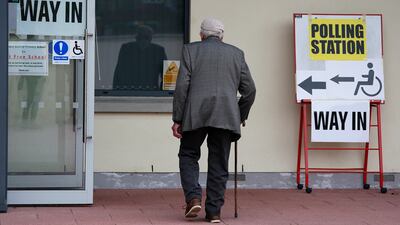Older generations could be motivated to support policies to help the young in Britain's next general election, new research has suggested.
A study by the Nuffield Politics Research Centre in collaboration with the Resolution Foundation found that having younger family members who are struggling financially is a key voting incentive among those in their 40s, 50s and 60s.
The so-called Family Fortunes Voters, as the researchers call them, support policies such as free vocational education and childcare, as well as more affordable housing in their area, even if means they pay higher taxes as a result.
The group – those aged 40 and older with younger relatives struggling financially – represents about 17 per cent of the electorate.
Researchers surveyed more than 6,000 adults about living standards both current and future, financial security, the financial situation of family members and their support for political parties and policies.
A majority of those under 40 said they believed they would have a worse living standard over their lifetime than their parents.
Most people over 40 agreed the young are worse-off financially and said they supported policies aimed at young adults, even at the cost of higher taxes.
“Middle-aged and older adults, who are worried about their younger relatives’ finances – Family Fortunes Voters – make up almost one in six people in the electorate, yet they have not been identified before,” said study author Dr Zack Grant of the Nuffield Politics Research Centre.
“Understanding this group goes some way to challenging common views about political conflict between the generations.
“Family Fortunes Voters are a substantial ‘hidden electorate’, who look set to reward parties that improve the living standards of their loved ones, and reject those which do not.”
Prof Jane Green, co-author and director of the centre, said the report’s findings should act as a “warning” to the Conservative Party.
“A failure to raise the average level of well-being among younger adults may not just harm the party among millennials and Generation Z: it might also cost them votes from their parents and grandparents,” she said.
“Through a combination of family connection, concern and heightened awareness for younger family members’ economic experiences, substantial proportions of the older generation are aware of the economic disparities being felt across generations and are motivated to support policies that do something about them.”
Almost two thirds, or 65 per cent, of over 60s supported increased spending on more free vocational education, while 61 per cent support more local affordable housing, and 47 per cent support more free childcare.
Middle-aged adults, those aged 40 to 59, are “similarly enthusiastic”, said researchers.
Policies aimed at young adults are more popular among those with struggling younger relatives than those without, sometimes by a margin of more than 10 percentage points.
The study found those older than 60 with younger family members who are struggling financially were 13 percentage points less likely to support the Conservatives, and nine percentage points more likely to support Labour, than the average person of their age.
For those in their 40s and 50s the gaps are seven percentage points and five percentage points, respectively.
Almost one third of people aged 40-plus think they will need to provide significant financial or practical support to younger family members within the next decade: another major incentive for them to support state investment in the young.
“Fairness between generations is a hot topic, as younger generations struggle with insecurity at work and at home, along with decades of low pay growth and high housing costs,” said Sophie Hale, principal economist at the Resolution Foundation.
She said the issues would “loom large” in the minds of younger voters.
“That doesn't mean they don't matter to older people, though,” she added.
“Many have concerns about struggling younger family members and are keen to see policies that will help them become financially secure. This intergenerational solidarity should put more pressure on politicians to address these issues.”


